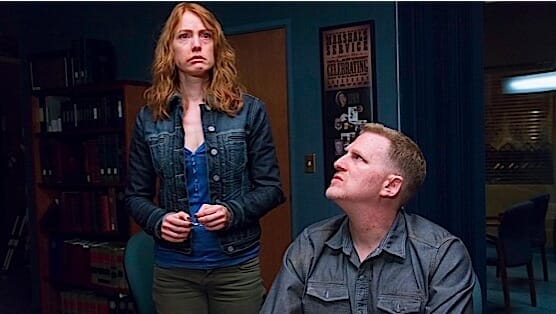Justified: “Starvation”
(Episode 5.12)

“Once you fire this bullet, it don’t go back in the barrel.” —Judge Mike “The Hammer” Reardon
I’m sad to report that the momentum kick-started by last week’s stellar episode hit some speed bumps this week.
“Starvation” isn’t a bad episode by any means, but like so many episodes this year, it is surprisingly uneven, made up of varyingly successful scenes punctuated by occasional brilliance. Sadly, this all comes at a time when we needed another powerhouse episode to set our character’s motivations in stone and give the audience a sense of clarity not only for the season finale but also as a lead in to next year’s series conclusion. Instead, we got muddy motivations and muddy moves. The stakes are higher than ever, but the focus felt all over the place. Even the editing seemed a bit off-key as I often felt as if we were cutting away in the middle of scenes.
Michael Rapaport turned out to be a high point of the week. Darryl’s new role as brute suits him well, and from his brutal dispatching of Mikey to sacrificing his sister, his actions and planning all fell in line with everything we know about the character. You would think that such a predictable character would be easier to catch, and I’ve been a bit confused all season as to why so many other characters regularly comment about what a cunning operator Darryl is (never a good sign). To the contrary, Darryl has only one real motivation: self-preservation. He can preach family values all he wants, but whether his momentary goal is money or power, it is all in the service of preserving his own skin. So it feels a little disingenuous to think that two proven game-players would think that they could trap Darryl just by dangling a carrot in front of him.
If that was where the “off” feeling character weirdness ended, it wouldn’t have been a big deal, but the bulk of the episode felt that way to me. There were multiple big, consequence-filled moments for our big three this week and while I am happy to see developments, I couldn’t shake a nagging sense that some of the creative decisions were calculated to set up next season rather than genuine, organic character progression. For instance, I could make the argument that Boyd’s decision to play his one “get out of jail free” card for himself rather than to save Ava was entirely in character. After all, at the end of last season when he had a chance to potentially become legitimate and start a future with Ava, he chose instead to get into bed with Wynn Duffy and the Detroit Mafia. It goes without saying that Boyd has a strong predilection toward self-preservation. But that doesn’t mean that it always feels right. After all, this is a very different Boyd than the Boyd who partnered with Duffy, and after an entire season of unbelievable sacrifice, something about this gnaws at me especially since he was so close to success after kidnapping the lovestruck guard. The one rationale I can come up with is that Boyd does seem to harbor some level of resentment toward Ava for killing Delroy and potentially even more for getting caught. (We saw him lash out at her for the latter just a few episodes ago.)
If that is the case, then it does seem more than a little hypocritical for Boyd to judge her given the damage he deals in a given week. Perhaps, though, it is the fact that Boyd maims and kills for money and power, but never purely for emotional reasons. (The operative word there is “purely.”) Thus, he could view Ava’s indiscretion as a form of regrettable weakness. Another possibility is that Boyd has come to realize what his quest to free Ava has cost him. He has no contacts, no leverage and no army at the worst possible time with the Mexicans bearing down on him. If either of these ideas factored into his deal with Raylan, then they should have been developed more before we got to this point. Just a week ago, Boyd was still professing his love and vowing to never stop fighting to free her and continue their lives together. And don’t try and tell me that her “breaking up” with him changed anything. Boyd knows exactly what Ava is up against in there, and I don’t believe for a second that her attempt to martyr herself affected him in the least.
Things started out quite well. There’s Wynn Duffy akimbo, which is always a good thing. (Dear FX Network, find a starring vehicle for Jere Burns as soon as possible. I understand he may have some free time about a year from now.) I still don’t entirely buy the Mexicans as threatening, but I can’t wait for Raylan to finally meet them so that he can ask if there was a special on mock turtlenecks at the Gap. Erica Tazel leading the Marshal trio is awesome. The Jason Statham love is excellent. Towing the Winnebago is genius. Pretty much everything works up until Boyd walks into the Marshals office and declares himself the messiah. Well, everything except for one tiny little scene.
-

-

-

-

-

-

-

-

-

-

-

-

-

-

-

-

-

-

-

-

-

-

-

-

-

-

-

-

-

-

-

-

-

-

-

-

-

-

-

-








































